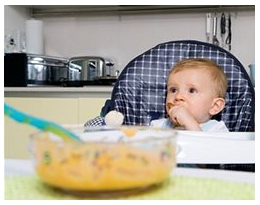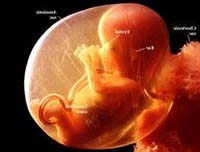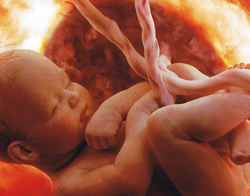 Now that your baby has reached the age of 4-6 months, he or she might be ready for his/her first taste of food other than breast milk or formula. There are usually a few clues you can look for that help you determine whether your baby is ready or not.
Now that your baby has reached the age of 4-6 months, he or she might be ready for his/her first taste of food other than breast milk or formula. There are usually a few clues you can look for that help you determine whether your baby is ready or not.
Signs Baby Is Ready For Solids
- His/her birth weight has doubled
- He/she can sit up with support (such as in a high chair)
- He/she is showing interest in what others are eating (trying to rip that hamburger right out of your hands)
- His/her extrusion reflux is disappearing. This is the reflux that makes them push their tongue out. Until this reflux goes away, they will instinctively push the food back out of their mouths with their tongue.
- He/she drinks more than 32 ounces of breast milk or formula each day.
Introducing New Foods To Baby
With any new food, you want to wait about 5 days before introducing another new food, so that you can determine whether or not the baby is intolerant or allergic. This will also help you pinpoint which food caused any reactions your baby might have. If you have food allergies, asthma or eczema in your family you might want to talk to your doctor about food allergies and what foods your baby should be staying away from in the early stages. One of the best foods to start with is rice cereal. This single grain cereal is iron-fortified and is easily digested by baby’s sensitive tummy. It is also one of the least likely cereals to cause an allergic reaction. The first meal is going to be really messy and they probably won’t eat much at all, so don’t be worried. It is going to take patience and time in order for them to get the hang of it.- For the first meal, mix 1 teaspoon of cereal with 4-5 teaspoons of warm breast milk, formula or water.
- Use a soft baby spoon to gently place a small amount of the cereal onto the baby’s tongue. Don’t be surprised if they push it right back out again.
- Keep going until the baby turns his/her head or they finish their meal.
- Gradually increase the amount of food once your baby gets the hang of it. You can also start to increase the consistency of the food as well once the baby gets older.
Healthy First Baby Foods
- Sweet potatoes – beta carotene, vitamin C and vitamin B6
- Applesauce – vitamin C
- Pears – vitamins C and A
- Peas – vitamin C, vitamin B1 and iron
- Avocado – potassium, vitamin B, vitamin E and vitamin K
- Bananas – potassium
- Squash (acorn, yellow, butternut, zucchini) – vitamin C
- Carrots – beta carotene, vitamin C
- Peaches/nectarines – vitamin C
- Green beans – vitamin C
First Baby Foods



